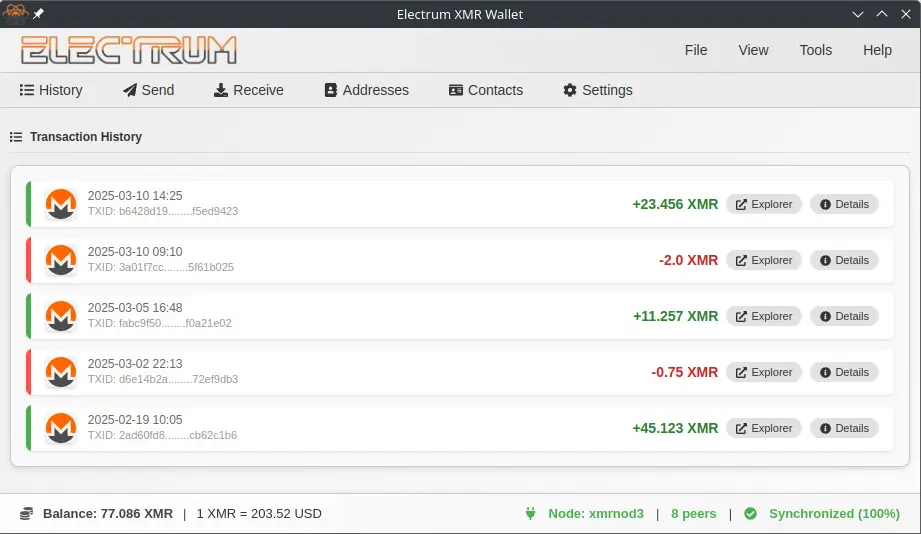What’s new in v2.3.0
- 4× faster initial sync
- HW-wallet auto-detect
- 16 critical fixes
Safely send, receive, and store your Monero (XMR) with our user-friendly wallet. Experience top-tier privacy with ring signatures, full control over your private keys, and lightning-fast transactions across platforms.

Keep your transactions confidential and your financial data private.
You are in control of your funds with secure and easy account management.
Available on all major platforms, ensuring seamless access to your XMR.
We're a team of privacy-focused finance enthusiasts committed to giving you full control over your funds with military-grade security and complete anonymity.


The wallet’s source code is open for anyone to review and audit.

Protects your privacy by mixing your transactions with others.

Connect to remote nodes to perform transactions without running a full node.

Add an extra layer of security with two-factor authentication.

Generate one-time addresses for each transaction to ensure privacy.

Conceals the amount and details of your transactions for enhanced privacy.

Store your private keys offline on a compatible hardware wallet.
Coins live on-chain, not on the phone or laptop. If the hardware is lost or destroyed, simply install Electrum XMR on a new device and enter your seed. The wallet will rescan recent blocks and recreate your balance and transaction history. Consider encrypting a digital copy of the seed and storing it in cloud cold storage as a backup.
Yes. Private spend/view keys are generated locally and never touch our servers. Your 25-word seed is enough to restore the wallet anywhere, so as long as you have it, you remain in full control. Remote nodes see only view-key–derived requests, which can’t spend funds.
Since v2.3.0 the wallet performs a lightweight scan against remote nodes, downloading just the key-image set it needs. On a 100 Mbps link that's typically 7–10 min to full usability instead of 40+. Power users can still run a local daemon; the first launch will prefer the fastest public node, then ask if you'd like to switch once the local chain is ready.
Ledger Nano S/X and Trezor T are auto-detected for secure signing.
All releases ship with .asc signatures. Use gpg --verify before installing to ensure authenticity.
The entire codebase is MIT-licensed and hosted on GitHub. Anyone can audit, fork or contribute—there are no proprietary blobs.
Android is in open beta on GitHub Releases. iOS TestFlight is scheduled for Q4 2025, pending App Store review of the Monero core libraries. In the meantime, the desktop seed is fully compatible with both mobile builds—you can hop between devices seamlessly.
Fees follow network congestion. The in-app slider shows real-time cost estimates in XMR and fiat.
Absolutely. Spin up monerod --restricted-rpc, open port 18081, then paste http(s)://your-IP:18081 into Settings → Network → Custom node. The wallet will verify the handshake and persist the node between sessions. Local nodes give maximum privacy and allow zero-trust view-key scans.
Experimental XMR→BTC swaps via COMIT are available behind a flag; expect main-net support later this year.
Community translations: English, Spanish, Chinese, French, German, Portuguese, Turkish, Korean, Japanese—more welcome on Weblate.
Quick help: r/Monero on Reddit, Matrix room #monero:matrix.org, or GitHub Issues for bugs. For real-time chat hop into #monero-dev on Libera IRC.